Scutula is a genus of lichenicolous fungi in the family Ramalinaceae.

The Ramalinaceae are a family of lichenized fungi in the order Lecanorales. The family name is synonymous with the name Bacidiaceae. Species of this family have a widespread distribution.
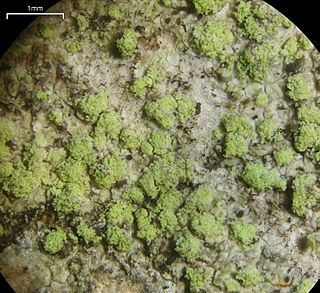
Biatora is a genus of lichens in the family Ramalinaceae. First described in 1817, the genus consists of crustose and squamulose lichens with green algal photobionts, biatorine apothecia, colorless, simple to 3-septate ascospores, and bacilliform pycnospores. According to the Dictionary of the Fungi, the genus contains 42 species that are widely distributed in temperate areas.

Bacidina is a genus of lichens in the family Ramalinaceae. It was circumscribed by Czech lichenologist Antonín Vězda in 1990, with Bacidina phacodes assigned as the type species. Vězda included 11 species in Bacidina, which was originally classified in the Lecideaceae. These species had previously been placed in genus Bacidia.
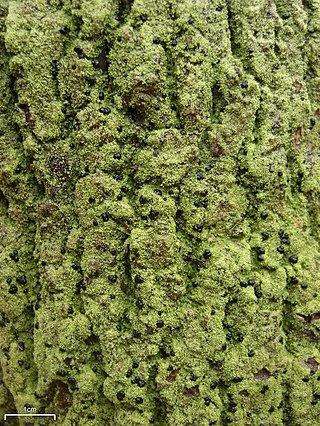
Bacidia is a genus of lichen-forming fungi in the family Ramalinaceae. The genus was circumscribed by Giuseppe De Notaris in 1846. Species in the genus are crust-like lichens with stemless apothecia; they have green algae as photobionts. Their asci have 8 colourless, cylindrical to acicular, multiseptate spores, with curved and thread-like conidia.
Adelolecia is a genus of crustose lichens in the family Lecanoraceae. The genus was circumscribed by Hannes Hertel and Josef Hafellner in 1984. The genus was formerly classified in the family Ramalinaceae, but molecular phylogenetic analysis showed it to belong to the Lecanoraceae.
Aciculopsora is a genus of lichens in the family Ramalinaceae. It was circumscribed by lichenologists André Aptroot and Marie Trest in 2006.
Crustospathula is a genus of five species of crustose lichens in the family Malmideaceae. They are characterized by their stalked and sometimes branched cartilaginous soredia and Bacidia-like apothecia.
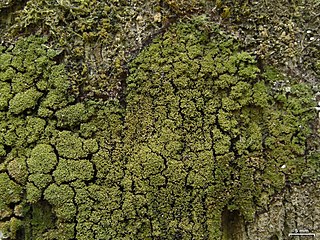
Phyllopsora is a genus of lichenized fungi in the family Ramalinaceae. It was circumscribed by Swiss botanist Johannes Müller Argoviensis in 1894.
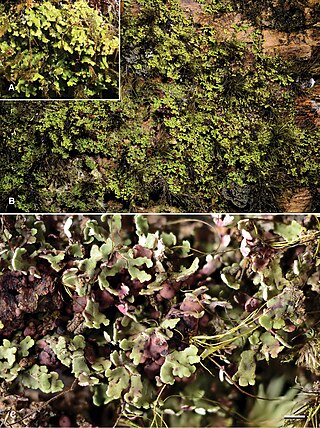
Krogia is a genus of corticolous lichens in the family Ramalinaceae. It occurs in tropical humid forests and rainforests. The genus was circumscribed by Norwegian lichenologist Einar Timdal in 2002, with Krogia coralloides assigned as the type species.

Toniniopsis is a genus of crustose and squamulose lichens in the family Ramalinaceae. The genus was circumscribed by Swiss lichenologist Eduard Frey in 1926, with Toniniopsis obscura designated the type and only species. The genus name of Toniniopsis is in honour of Carlo Tonini (1803–1877), who was an Italian chemist and botanist (Lichenology), who worked in Verona and was a member and President of the Academy of Agriculture. As a result of molecular phylogenetic studies, several species, formerly classified in genus Bacidia, have been transferred to Toniniopsis.

Toninia is a genus of lichen-forming fungi in the family Ramalinaceae.

Rhizocarpon is a genus of crustose, saxicolous, lecideoid lichens in the family Rhizocarpaceae. The genus is common in arctic-alpine environments, but also occurs throughout temperate, subtropical, and even tropical regions. They are commonly known as map lichens because of the prothallus forming border-like bands between colonies in some species, like the common map lichen.

Hypocenomyce is a genus of lichen-forming fungi in the family Ophioparmaceae. Species in the genus grow on bark and on wood, especially on burned tree stumps and trunks in coniferous forest. Hypocenomyce lichens are widely distributed in the northern hemisphere.
Hildur Krog was a Norwegian botanist.
Bibbya is a genus of fruticose lichens in the family Ramalinaceae.
Biatora oxneri is a species of corticolous (bark-dwelling) lichen in the family Ramalinaceae. It is found in the Russian Far East and in South Korea.
Phyllopsora amazonica is a species of corticolous (bark-dwelling), crustose lichen in the family Ramalinaceae. It is found in the Amazon rainforest of Brazil.
Phyllopsora concinna is a species of corticolous (bark-dwelling), squamulose (scaley) lichen in the family Ramalinaceae. Found in Central and South America, it was formally described as a new species in 2019 by lichenologists Sonja Kistenich and Einar Timdal. The lichen has a scaley, effuse (spread-out) thallus that is pale green with a well-developed, white prothallus. Apothecia occur rarely; they are brownish with a paler margin, measuring up to 1 mm in diameter. Ascospores are simple with a narrow ellipsoid to fusiform shape, and dimensions of 12.5–16·0 by 3.5–4.0 μm. Atranorin and parvifoliellin are major lichen products that occur in this species. The latter compound distinguishes it chemically from the morphologically similar species Phyllopsora cinchonarum, which instead contains lobaric acid. The botanical name concinna, refers to its "beautiful" appearance.
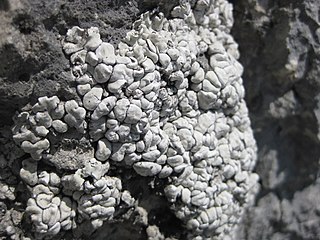
Thalloidima is a genus of lichen-forming fungi in the family Ramalinaceae. It has 13 species.










